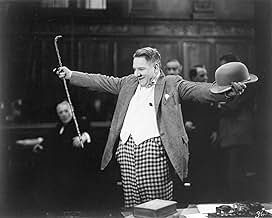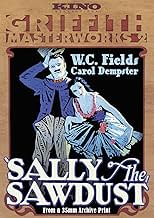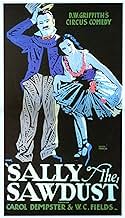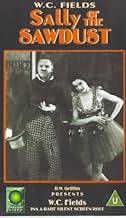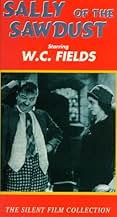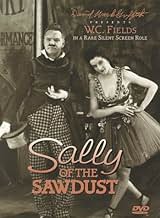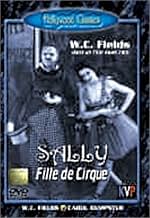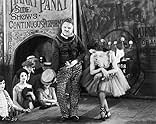Judge Foster throws his daughter out because she married a circus man. She leaves her baby girl with Prof. McGargle before she dies. Years later Sally is a dancer with whom Peyton, a son of ... Read allJudge Foster throws his daughter out because she married a circus man. She leaves her baby girl with Prof. McGargle before she dies. Years later Sally is a dancer with whom Peyton, a son of Judge Foster's friend, falls in love. When Sally is arrested McGargle proves her real pare... Read allJudge Foster throws his daughter out because she married a circus man. She leaves her baby girl with Prof. McGargle before she dies. Years later Sally is a dancer with whom Peyton, a son of Judge Foster's friend, falls in love. When Sally is arrested McGargle proves her real parentage.
- Awards
- 3 wins total
- Leon - the Acrobat
- (as Glen Anders)
- Stooge
- (uncredited)
- Bandit
- (uncredited)
- Bit Role
- (uncredited)
- Yokel in the Old Army Game
- (uncredited)
- Director
- Writers
- All cast & crew
- Production, box office & more at IMDbPro
Featured reviews
The picture sees him teamed up with pioneer director D.W. Griffith, now sadly long past his glory days. Griffith was never really much of a comedy director. He doesn't seem to have the confidence in his performers to let them do their stuff and allow the scenes to play out. Instead he seems stuck in the Keystone Cops mode of slapstick, which is always very frenetic, with lots of cuts. In a way this works out well because Griffith could at least direct a good action sequence, and scenes like the punch-up at the circus even if not very funny are at least nicely timed and escalated. Besides, even if the comedy fails the general air of irreverence stops the picture from getting too mawkish.
It is also rather nice to see Griffith returning to a simple, human story, as his usual epics with ride-to-the-rescue finales had been getting a little stale of late. Sally of the Sawdust more than any other harks back to the short films he made in the early teens for the way he focuses on individuals rather than wider social processes. There are some good examples of the way he builds up an emotional story. In the prologue, when the daughter is kicked out, we see the mother and father turn away from each other to face opposite walls, the camera well back in the large space, a perfect evocation of this cold, fractured household. And Griffith is still so good at expressing a feeling with the most delicate of close-ups, showing us for example Carol Dempster's hand clutching at the grass as she canoodles with Alfred Lunt. Acting performances vary immensely across Griffith's body of work, but the relatively restrained turns from Dempster and Elfie Shannon as old Mrs Foster add immensely to the poignant final scenes.
But what of W.C. Fields himself? We here and there see him going off into some bit of comedy business, but the truth is as a slapstick comic he is nothing really exceptional. He doesn't have the energy or flexibility to keep up with the wilder slapstick, and sequences like the one where he keeps knocking off his own hat just look out of place. Of course there is a lot more for him to do in Sally of the Sawdust, and Fields is at his funniest when simply acting out bits of the play (presumably kept intact from the original stage version) in his own characteristic manner. When trying to evade the police, he emerges from his hiding place wrapped in a cloak disguised as an Indian, and it is the way he strolls towards the camera, nonchalantly puffing on a cigar, that makes the moment funny. Still, there is clearly something missing from the act – the delivery, the voice, not to mention the opportunity to develop a curmudgeonly character without having to occasionally play the clown. It is no wonder his screen career never really took off until the arrival of the talkies.
This is not, of course, D. W. Griffith's masterpiece, but it does showcase his film-making savvy in full maturity. He uses all his innovations, which are techniques we take for granted now: close- ups, cross-cutting, a mobile camera, and the ability to modify acting from theatrical exaggeration to cinematic subtlety.
W. C. Fields also showcases his skills-- not his signature gruff delivery, but his remarkable dexterity as a physical comedian. He does a few inventive juggling acts, cut too short to be fully appreciated, and some very deft pickpocketing, but it seems that every prop that comes within reach gets manipulated for comic effect-- hat, cane, car roof, dog, cash. He's a joy to behold.
Much has been said against Carol Dempster as an actress, but not by me. She was 22 at the time, playing a teenager, and her combination of grace and awkwardness is engaging, particularly when she dances. She's not a beauty-- though she's positively luminous in the scene where she's gussied up like a Talmadge sister-- but her plainness enhances her simple affection for Fields, her guardian.
Finally, there is Alfred Lunt in one of his rare film roles, as a dashing leading man. He and his British wife Lynne Fontane (a lavender marriage) made one talkie together-- a wonderfully funny one, "The Guardsman," in 1931-- after which they quit movies forever for the Broadway stage, where they reigned from 1923 to 1957. So famous and powerful were they that they would only accept theatrical contracts which allowed them to work together. As for movies, Fontanne wrote to the Hollywood producer who tried to lure them back with huge flippin' wadges of cash, "We can be bought, but we cannot be bored."
The breathtaking beauty of earlier D.W. Griffith-directed films is noticeably absent. While some of the shots are lovely, nothing equals the artfulness evident throughout many past Griffith efforts. "Sally of the Sawdust" is beautifully preserved (if only all Griffith prints were as well preserved); and, it is an enjoyable comedy (certainly more so in 1925). It was adapted from Dorothy Donnelly's popular play "Poppy" (1923), with Madge Kennedy and W.C. Fields. It was re-filmed as "Poppy" (1936), with Rochelle Hudson and W.C. Fields. Norma Talmadge's popular film was an altogether different "Poppy" (1917), and did not co-star W.C. Fields.
***** Sally of the Sawdust (8/2/25) D.W. Griffith ~ Carol Dempster, W.C. Fields, Alfred Lunt
I did enjoy this film. I thought Carol Dempster was good in her role, but of course I was more interested in the times when Fields is on screen. There are some specific moments for Fields fans to savour. The fleeting shots of his juggling skills, the first evidence of the subtle reactions and gestures that we know from his classic talkies of the 1930's, and the peanut cart disguise for a liquor cabinet that survives from his Zeigfield Follies days.
This won't be a movie I turn to as often as I do to the great W.C. Fields films of 1932-34, but I'm just so glad that it has not been lost to us as have been other of Fields silent film work.
For SALLY OF THE SAWDUST, being the best known feature length film for either WC Fields or Carol Dempster during the silent era, mainly due to its current availability and frequent revivals, it's nearly forgotten that this particular assignment was actually directed by the father of film himself, DW Griffith, in spite the fact that many of his famous trademarks are evident here, such as his signature beneath the title cards; numerous closeups on the title character being Dempster; flashbacks giving insight to Sally's origins, her mother, and how McGargle was chosen as the little girl's guardian prior to her mother's death; along with cut to the chase and last minute rescues. For today's audience aware of this film's very existence, SALLY OF THE SAWDUST is remembered solely as a Fields comedy, but it's Dempster who acquires most of the attention under Griffith's careful supervision. Dressed nearly throughout the story in shabby attire, one scene, set during a society function, spotlights Dempster's Sally all dolled up in elegant fashion, styled hair, necklaces, and wearing low-cut evening gowns.
As for the story, Sally (Carol Dempster) is the circus waif reared by Professor Eustance McGargle (WC Fields), a lovable con man, sideshow juggler and entertainer. (Flashbacks reveal that Sally, whose mother had married a circus man against the wishes of her father, later becoming a widow with a child, and before she, too, dies, entrusts her little girl to their best friend, McGargle.) Now that Sally is a young adult, McGargle comes to the conclusion that Sally is growing up and decides to return her to grandparents, now living in Green Meadow. Upon their arrival, they both stir up controversy when attending a charity bazaar for homeless children which is taking place near the estate of the very wealthy Judge Henry L. Foster (Erville Alderson) and his wife (Effie Shannon), who happen to be Sally's grandparents. Complications arise when Peyton Lennox (Alfred Lunt) ,the rich young son of a respected leading citizen engaged to marry a society society girl he does not love, becomes infatuated by the visiting Sally. After her "Pop" escapes arrest for dealing in a crooked card game, Sally, in turn is arrested and jailed, while Peyton gets sent out of town by his parents hoping that he'd forget about this common girl. As McGargle learns of Sally's predicament, he's in one himself being held hostage by bootleggers in a far away cottage.
Regardless of numerous changes from the original play, SALLY OF THE SAWDUST does remain loyal to Fields' character, a juggler and shifty con man who "never gives a sucker an even break," with motto being "It's the old Army game." Fields, who makes the most of his initial movie lead, does display his given talent through several key scenes, but it's director Griffith who makes one big mistake by shifting Fields' juggling act in the background with the camera range at a far distance distracted by the heads of his curious spectators, instead of focusing in a nearer range and center stage of him. While not one of the best comedies from the silent era, SALLY OF THE SAWDUST does include some fine comedic moments, mostly supplied by Fields himself.
SALLY OF THE SAWDUST was first introduced to public television as part of the 13-week 1971 presentation of THE SILENT YEARS, hosted by Orson Welles, which was, by this time, the only known surviving WC Fields from the silent era. During Welles' profile on both film and Fields, it's interesting to note how Welles affectionately spoke of Fields by addressing him as "Uncle Claude." Out of circulation for little over a decade, SALLY OF THE SAWDUST resurfaced on video cassette by the 1980s, with one of the distributors being Blackhawk Video, accompanied by Wurlitzer pipe organ score by Jack Ward, the same score that was used for THE SILENT YEARS. The movie's length, ranging from 90 minutes to nearly two hours, depending on the distributor and the silent projector speed. For an added bonus, KINO Video distributed the restored 112 minute VHS /DVD version with new orchestral score consisting of prologue opening and some lost footage supposedly unseen since its initial release.
Because of the mild success to SALLY OF THE SAWDUST, Griffith reunited Dempster and Fields in THAT ROYAL GIRL (1926). Due to the unavailability of that reunion, SALLY OF THE SAWDUST goes down in movie history as the one that paved the way to the future comedy cinematic world of a man named WC Fields. (***)
Did you know
- TriviaD.W. Griffith had good reason not to use the name or title "Poppy" for this movie -a movie titled "Poppy" with a character by that name had come out in 1917.
- GoofsWhen Sally and Eustache were lying on the railway, after get wet on the train, you can clearly see that the railway ends on the film studio wall, right behind them.
- ConnectionsFeatured in W.C. Fields: Straight Up (1986)
Details
Box office
- Gross US & Canada
- $304,081
- Runtime
- 1h 44m(104 min)
- Sound mix
- Aspect ratio
- 1.33 : 1

